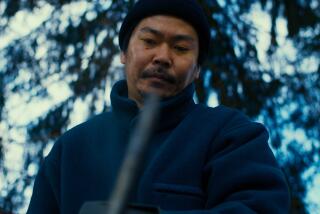Racing between dreams in a nightmarish scenario
- Share via
The girl of your dreams -- and his dreams, and her dreams -- the punkish heroine of Satoshi Kon’s “Paprika” is a double-agent-provocateur in a shape-shifting movie of marvelous, baffling complexities. It’s a long way from the more safely beautiful work of that Japanese Walt Disney, Hayao Miyazaki (“Spirited Away”). And it is also anime decidely for adults: Among “Paprika’s” thriller aspects, noirish angst and futuristic action, nothing is ever what it appears. Dreams intrude on dreams. Surfaces of reality fold over each other, like the petals on an origami chrysanthemum.
Kon’s previous feature, “Tokyo Godfathers” (he has made four now as a director), was narratively complicated, but the viewer was permitted to dwell on a single plane of perception. In Kon’s hallucinogenic “Paprika,” a device known as the DC-Mini, intended for use in psychotherapy, has been stolen, enabling the ill-intentioned thieves to intrude upon dreamers and trap them in their dreams.
An obvious precursor to all this is the considerably coarser “A Nightmare on Elm Street,” in which people were murdered while they slept. But “Paprika” is far closer in tone and intent to Chris Marker’s landmark “La Jetee,” or its mutant stepchild, “12 Monkeys”: The sense of having no feet on the ground is not limited to the characters. The audience too is careening about, strapped in at a demented carnival where realities bang together like bumper cars.
Adding to the visual cacophony is Kon’s sly interjection of pop cultural artifacts into his mix -- the ruins of a theme park, seen within a movie that occasionally seems reflected in a funhouse mirror, makes for profoundly disquieting imagery. So does Kon’s mischievous references to cinema itself, with “Paprika’s” story stepping in and out of actual theater screens, or its characters comparing dreams to shorts and blockbusters.
As Dr. Chiba (voice of Megumi Hayashibara), her colleague Tokita (Toru Furuya) and the dream-troubled detective (Akio Ohtsuka) strive to recapture the DC-Mini, a collective dream (something that reemerges periodically) is a marching, jostling parade of inanimate appliances, clocks, toys and what sounds like a calliope in reverse. “Isn’t it wonderful to see a friend’s dream as if it were your own?” the dreamy, obese genius Tokita asks at some early point in the film, and even then you know the answer: No, Tokita, it’s clearly a nightmare.
That the supposed bad guys are actually intent in preserving the sanctity of dreams adds to the disorienting exhilaration of Kon’s best work yet.
“Paprika.” MPAA rating: R for violent and sexual imagery. In Japanese with English subtitles. Running time: 1 hour, 30 minutes. In general release.
More to Read
Only good movies
Get the Indie Focus newsletter, Mark Olsen's weekly guide to the world of cinema.
You may occasionally receive promotional content from the Los Angeles Times.









